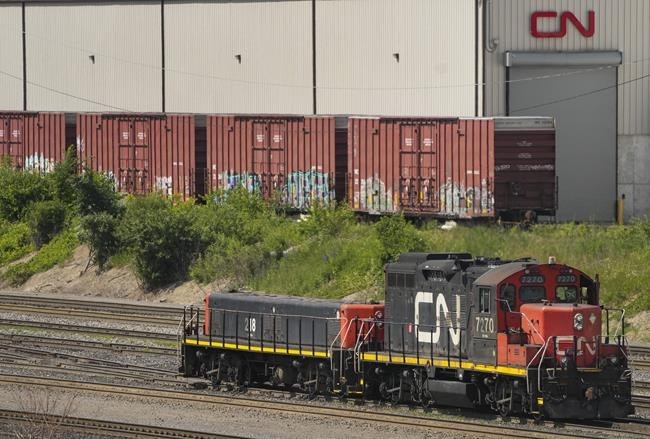MONTREAL — Canadian National Railway Co. reported a drastic drop in profits for the three months ended Sept. 30, citing falling consumer demand, fallout from the B.C. port workers strike and a raft of forest fires and floods.
Overstocked inventories and dockworkers' 13-day job action in July dented its cargo volumes and revenue, as did ravenous wildfires and floods at both ends of the country.
Net income in CN's third quarter fell 24 per cent from a year earlier, the company said.
"It was tough operating out there in quarter three," Ed Harris, CN's chief operating officer, told investors on a conference call Tuesday.
"We started out by dealing with a two-week port strike on the West Coast and then faced constant disruptions from forest fires and flooding until September," said Harris, who's set to step down from that role on Nov. 15.
The country's largest railway saw revenues in its biggest category — container shipping — drop by more than a third, due in part to consumers' smaller post-pandemic appetite for pricey products.
“I believe we’ve seen the bottom on volumes," CEO Tracy Robinson said, referring to container shipments. Nonetheless, she added that consumer activity “continues to be murky” amid an uncertain economic environment.
“What remains to be seen is exactly the strength of the economy returning.”
Container volumes at the B.C. ports of Vancouver and Prince Rupert failed to recover in August after the previous month's strike, dropping by 23 per cent and 59 per cent, respectively, according to RBC Capital Markets analyst Walter Spracklin. That trend lingered into September.
"The Canadian West Coast port strike this summer prompted vessel operators to divert away from Canadian ports entirely, to other destinations such as Los Angeles and Lázaro Cárdenas" — Mexico's largest seaport — Spracklin said in an Oct. 13 note to analysts.
"In our view, the Canadian West Coast ports are at risk of having lost volumes longer term to U.S. and Mexican alternatives."
CN chief marketing officer Doug MacDonald said the company is working to woo container customers back to Canadian ports and tracks following the costly shutdown of the country's biggest sea trade gateway.
“We continue to see a hangover effect," he said.
Depressed freight rates at trucking companies pose an added competitive challenge, executives said.
Robinson sought to reassure analysts despite the sharp decline, noting that domestic container shipments — as opposed to those bound for the U.S. — enjoyed sustained demand.
“We think this is a temporary issue," the CEO said, acknowledging that any ramp-up in international container traffic from B.C. docks may be gradual.
"We've lost a little confidence in the West Coast ports," she said.
All five of CN's bulk categories, from coal to forest products, saw a revenue decrease — except grain, which shot up 16 per cent on the back of a bumper wheat crop. Auto volumes also rose amid persistent demand following the supply chain backlog prompted by the COVID-19 pandemic.
Executives said CN continues to expect flat to slightly negative adjusted earnings this year, while forecasting growth of between 10 per cent and 15 per cent between 2024 and 2026.
On Tuesday, the railroad operator reported net income in its third quarter fell to $1.11 billion from $1.46 billion in the same period a year earlier.
Revenues decreased 12 per cent to $3.99 billion from $4.51 billion the year before, the Montreal-based company said.
On an adjusted basis, diluted earnings were down 21 per cent at $1.69 per share from $2.13 per share last year, slightly below analyst expectations of $1.72 per share, according to financial data firm Refinitiv.
This report by The Canadian Press was first published Oct. 24, 2023.
Companies in this story: (TSX:CNR)
Christopher Reynolds, The Canadian Press



